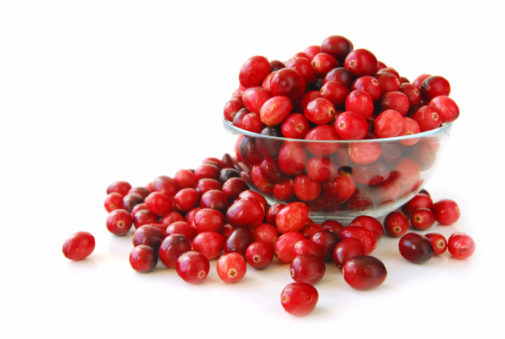![]()
Urinary tract infections (UTIs) and overactive bladder (OAB) are two common urological problems that Americans suffer from on a daily basis. There’s no need to get sidelined by these issues; several natural products can help.
A Cranberry A Day
UTIs are caused by bacteria or germs, like E. coli, that live in the large intestine (1). The urinary tract gets infected when germs make their way into the urethra, which transports urine outside the body (1). If left untreated, these germs can invade the bladder and kidneys, causing permanent damage (1). Though UTIs are common for both genders, women are more prone to them than men due to their small urethras (1). Some symptoms include pain or burning during urination, a heavy or tender stomach and kidney problems (1). Traditional methods of treatment call for antibiotics and drinking extra fluids, but recent studies have shown that cranberry products can help those with UTIs.
For instance, a 2012 study revealed that cranberry products have the potential to prevent UTIs (2). The researchers determined that “cranberry-containing products tend to be more effective in women with recurrent UTIs, children, cranberry juice drinkers, and people using cranberry-containing products more than twice daily” (2). Substances in cranberries prohibit bacteria from sticking to the urinary tract walls (3). Other studies have found that cranberry supplements did a better job than antibiotics at protecting against future UTIs (4).
Though most of the medical community champions these berries, the jury is still out on how much cranberry juice must be consumed in order to prevent infections; cranberry extract supplements are an option, too, pending a doctor’s approval (3).
Probiotics, Pumpkins and Prostate
Probiotic supplements may be another option for UTIs. Those who suffer from recurring UTIs often turn to antibiotics, which destroy friendly bacteria in our systems, thus contributing to a bacterial imbalance that allows infections to spread (5). Probiotics restore the commensal bacteria to the body and help “crowd out” infection-causing bacteria (4).
For those needing OAB support, consider pumpkin seeds, pumpkin seed oil or pumpkin seed extract supplements. Pumpkin seeds are approved by German health regulators as an acceptable treatment for several bladder conditions. These seeds contain fat-soluble and water-soluble sections (6). The fat-soluble portion of the seeds, or the oil, is often found in many urinary products. Meanwhile, the water-soluble component strengthens the female pelvic floor, thus decreasing the risk of contracting an infection and helping those with OAB (6).
An enlarged prostate can cause OAB in men, often diagnosed as benign prostate hyperplasia (BPH). Although symptoms vary, BPH contributes to a weak urine stream and frequent urination (7). Pumpkin seeds may help to shrink the prostate, thus relieving pressure on the urethra (8).
Studies have shown that saw palmetto may also relieve BPH symptoms (8). One study showed a specific saw palmetto ethanol extract (SPET-085) inhibits an enzyme linked to BPH called 5-alpha-reductase type II (13). The benefits of other supplements, like resveratrol and lycopene, are noteworthy. In a 2012 study, resveratrol helped suppress prostate cancer cell growth in a lab test and kill prostate tumor cells when combined with radiation treatment. Researchers say resveratrol may increase the activity of perforin and granzyme B, which are necessary to kill tumor cells (9).
Regarding lycopene, a survey of 40,000 men found that those who ate more than 10 servings of tomato-based foods daily had a 35% lower risk of developing prostate cancer than those who consumed less. In another study, men who took 50 mg of lycopene supplements daily had lower prostate-specific antigen (PSA) levels. High PSA levels are correlated with prostate cancer (10).
The herb pygeum (African Plum Extract) and grass pollen may also shrink the prostate and improve the flow of urine in men (11).
Last, some believe zinc deficiencies may be linked to BPH. Although more tests need to be conducted, 2011 research revealed that zinc blood levels were 27% lower in those with prostate cancer compared to other men (12). WF
References
1. WebMD, www.webmd.com/a-to-z-guides/urinary-tract-infections-in-teens-and-adults-topic-overview, accessed Apr. 25, 2013.
2. “Cranberry Products Associated with Prevention of Urinary Tract Infections,” JAMA Internal Medicine Releases, July 09, 2012, http://media.jamanetwork.com/news-item/cranberry-products-associated-prevention-urinary-tract-infections, accessed Apr. 25, 2013.
3. WebMD, www.webmd.com/urinary-incontinence-oab/womens-guide/cranberries-for-uti-protection, accessed Apr. 25, 2013.
4. K. Chiarello-Ebner, “Staying on Tract,” WholeFoods Mag. 35 (10), 38–41 (2012).
5. M.H. Hsieh, “More Evidence That Probiotics May Prevent UTI,” Apr. 21, 2011 http://uti.stanford.edu/blog/archives/2011/04/more-evidence-t.html, accessed Apr. 25, 2013.
6. W. Faloon, “A Breakthrough in the Relief of Overactive Bladder and Urinary Incontinence,” Life Extension Magazine, Nov. 2008, www.lef.org/magazine/mag2008/nov2008_Pumpkin-Seed-Relieves-Overactive-Bladder-Urinary-Incontinence_01.htm, accessed Apr. 25, 2013.
7. National Kidney and Urologic Diseases Information Clearinghouse, “Prostate Enlargement,” http://kidney.niddk.nih.gov/kudiseases/pubs/prostateenlargement, accessed Apr. 25, 2013.
8. L. Goldstein, “Pumpkin Seeds for Prostate,” www.prevention.com/food/food-remedies/prostate-and-pumpkin-seeds, accessed Apr. 25, 2013.
9. G. Tsang, “Lycopene in Tomatoes and Prostate Cancer,” www.healthcastle.com/lycopene-prostatecancer.shtml, accessed Apr. 25, 2013.
10. “Resveratrol Kills Prostate Cancer Cells in Lab,” WholeFoods Mag. 36 (1), 13 (2013).
11. University of Maryland Medical Center, “Benign Prostatic Hyperplasia,” www.umm.edu/altmed/articles/benign-prostatic-000018.htm, accessed Apr. 25, 2013.
12. P. Christudoss, et al., “Zinc Status of Patients with Benign Prostatic Hyperplasia and Prostate Carcinoma,” Indian J. Urol. 27 (1), 14–18 (2011).
13. P. Pais, “Potency of a Novel Saw Palmetto Ethanol Extract, SPET-085, for Inhibition of 5a-Reductase II,” Adv. Ther. 27 (7), 555–563 (2010).
Published in WholeFoods Magazine, June 2013










